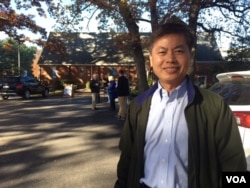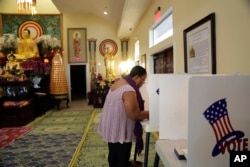As voters head to the polls in perhaps the most contentious US election in recent history, experts have warned that the low level of debate has damaged American interests in developing countries such as Cambodia.
Speaking during a recent visit to the United States by a group of Cambodian journalists, their American counterparts and political experts said this had been the “craziest” election campaign in memory.
Donald Trump, a multi-millionaire businessman and Republican candidate, has employed fiery language and stoked controversy with repeated gaffes and threats that have seemingly worked in his favor, while allegations of ties to organized crime and the Kremlin have dogged his campaign.
Meanwhile, Democrat candidate Hillary Clinton, former secretary of state and first lady, has faced conflict-of-interest allegations over her relationship with Wall Street and use of a private email server for official business.
Ken Vogel, chief investigative reporter at Politico, a Washington DC-based news organization, said this year’s campaigning had echoed political campaigns of two centuries ago.
“[I]n the early days in our country, 200 years ago, we did see very nasty personal claims made by candidates against other candidates, and we saw candidates challenging each other to dual like they were going to shoot each other,” he said.
“It is not entirely new, but it is new in sort of this [modern social media] context,” he added, noting this U.S. campaign had mirrored recent elections in Italy, Serbia, Bosnia and the Philippines.
Ed Horowitz, associate professor of communications at Cleveland State University in Cleveland OH., asked how this election cycle would be remembered.
“As a professor, I think about it as two possibilities. Number one: this is a bump in the road because Donald is an unusual candidate,” he said.
“Number two: this campaigning is the beginning of a new type of campaigning. As a professor of communication I am particularly interested in how the candidates use mass media, and Donald Trump has been an expert in using Twitter in a way that no one has ever had done,” Horowitz said.
Charles Noble, professor with the Department of Political Science at California State University in Long Beach CA, said the debates had raised serious questions about the format and its use.
“There are questions about how suitable they [the debates] are for our politics, because people think they are increasingly a kind of circus rather than a serious effort to inform,” he said.
James Sheeler, professor of journalism and media writing at Case Western University in Cleveland OH., said that Trump’s suggestion that he would not accept the result of the election if he lost – that it would have been “rigged” – potentially could incite violence.
“It’s actually been a very interesting time in journalism in the United States right now because now the American journalists are trying to fact-check Donald [Trump] and Hillary Clinton and call them out, especially now Donald Trump is saying that the election is rigged,” he said.
“This is something that never happened before, for a candidate running, to be saying I might not accept the result for the election,” Sheeler said.
Southeast Asia experts see parallels in the tone of this year’s US election and campaigns in those in the region.
John D. Ciorciari, a Southeast Asia specialist at the Gerald R. Ford School of Public Policy at the University of Michigan, says, “This year’s U.S. presidential election is deeply troubling.”
“Partisan spin, sound-byte policy pronouncements, and hyperbolic attacks on opposing candidates are nothing new to American politics, but this presidential election has been particularly ugly.
“Donald Trump’s vague accusations that the election is ‘rigged’ and threat to reject adverse results jeopardize a crucial tenet of U.S. democracy – a shared commitment to submit to established electoral mechanisms.”
“Americans are fortunate to enjoy a relatively stable democratic system built over a long period of time. We should not take that system for granted,” Ciorciari said.
Sophal Ear, Associate Professor of Diplomacy and World Affairs at Occidental College in Los Angeles CA., said the election this year is the “worst” election he has ever observed.
“To a great extent the damage is already done. It took 240 years of work, and one man, in one election cycle, has managed to smash quite a bit of this work. Hopefully, he will just be a footnote in history, but the damage will last for years, if not decades, reputationally, for the brand that is American democracy,” Sophal Ear said.
He added that the election rhetoric would create a “moral equivalence” argument for repressive and corrupt regimes, who could create a narrative of, “Everyone does it so it’s neither right nor wrong.”
However, David Josar, deputy spokesman for the US Embassy in Phnom Penh, said the country’s election process involved “free, wide-ranging debate.”
“No matter who wins the White House, the United States and Cambodia share a strong relationship based on mutually beneficial trade, collaboration on development, security cooperation, and active people-to-people exchanges,” he said.

















